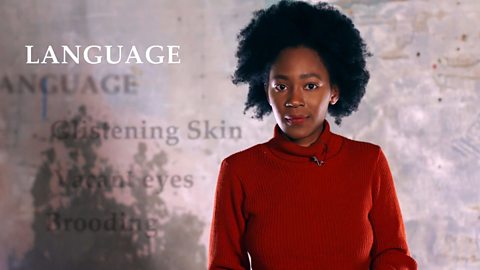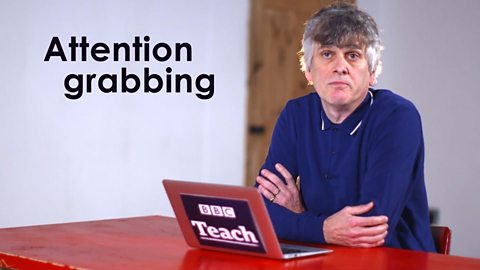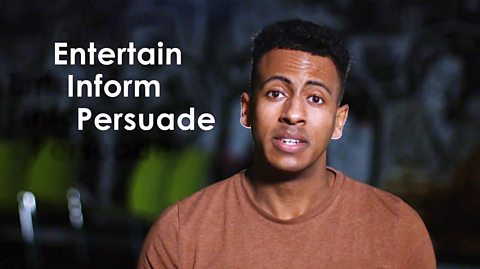Narrator:
In this film, two professional writers have been brought together to answer a GCSE English Language question under exam conditions. Solomon OB is an Award Winning Poet and Musician.
Solomon OB:
So like first exam since maybe like ten years ago.
Narrator:
And.
Sophia Thakur:
I am Sophia Thakur and I'm a Performance Poet and Storyteller. I'm a little bit nervous but, interested to see what will come out. Either write about a holiday that went wrong, you could write about a real experience or an imagined one.
Solomon OB:
Or, describe a trip into the mountains, as suggested by the picture below. You could write about a real experience or an imagined one.
Sophia Thakur:
So, I made sure that I read and re-read and re-read the question.
Solomon OB:
Why does this feel like an actual exam? I'm on the spot.
Sophia Thakur:
Solomon and I both decided to go for the mountain question. What can happen on a trip to the mountain that makes for a good story? Hmm.
Solomon OB:
To be creative you have to allow yourself some thinking time, yeah, I try and find inspiration from anything or anywhere really like, even just looking around the room for little prompts to help guide the story.
Sophia Thakur:
Before you start writing your story, its important to make a good plan. I put the word mountain in the middle of a mind map and then just drew stems from there and after every branch that came off, it sort of triggers new ideas.
Solomon OB:
My plan was kind of built off of, I call um like little islands. In any piece of writing the first paragraph has a lot of work to do. I love it when a story really quickly pulls me into the world just through like, through its beginning. A cobbled street, black and white paved. Each slab laid with a question underneath, the answers he would find along the way.
Sophia Thakur:
You engage the reader into the narrative straight away by introducing this idea of a street and then sort of a character playing this game, its really, its gripping. This is my first paragraph. Did you see that? Emerald asked Chantelle, or maybe she was talking to me, but at this point her never-ending questions had me fatigue. Maybe even more so than the hike.
Solomon OB:
Yeah, I think the way you've laid it all out keeps me intrigued in the story and I want to know more of whats gonna happen. I would say beginning, middle and end in the story is like a skeleton to a body, it gives you places to be able to attach the details, the character dynamics, all that stuff on top of a strong foundation.
Sophia Thakur:
Imagine you have a camera with a zoom lens, in your opening paragraph you can use an extreme close up, tell us the details of someone or something in your story then in each of the paragraphs that follow, you can zoom out a little more, giving us the bigger picture. Alternatively, you can start with the big picture and then zoom into the important details. If Sophia wants to ever return home, Sophia must play this game. Our cards have been dealt for us, these hills really had eyes. We pressed enter.
Solomon OB:
I think in terms of structure, this story's kind of slowly pushing itself on, its like we're getting a little snippet of whats happening, more description of the characters, the world that they're actually in and then we get edged on even further, until we get to a bit of a climax. Well achieved.
Sophia Thakur:
Thank you.
Solomon OB:
He was asleep, but would awake in his own bed, as the stars carried him home.
Sophia Thakur:
You closed the book, you sort of, it was a clear finish in terms of he left the scene, the stars left the scene, he was carried away, the reader now has to exit.
Narrator:
There are lots of ways that we use language when we're writing, you'll find it helps to remember what some of them are.
Sophia Thakur:
A simile is comparing one thing to another as a means to describe it.
Solomon OB:
Alliteration is when you're using several words with the same letter at the start, like Solomon simply said.
Sophia Thakur:
Onomatopoeia is.
Solomon OB:
Like crash, bang and wallop, when like the sound, how do you, how do you describe that?
Sophia Thakur:
The sounds that some things make so writing something like sizzle, or writing something like bang.
Solomon OB:
The word sounds like the sound it represents, yeah [LAUGHS]
Sophia Thakur:
Personification is giving a non-human object human or natural characteristics. So, describing lets say a chair as fleshy.
Solomon OB:
He fell into bliss as the stars kissed his skin, and he floated upon the vapours of galaxies, drifting into an abyss.
Sophia Thakur:
Your personification was just ridiculous, the way that you describe how the sort of clouds and the sky and the ocean and the land all work around this human in terms of folding and cracking and kissing and doing human things.
Solomon OB:
It's worth remembering to show and not to tell, use descriptive words to describe an event, don't just state what happened. The stars dressed his pyjamas as they picked him out of the path of a black hole, he was asleep, but would awake in his own bed as the stars carried him home.
Sophia Thakur:
You picked out the movement in what was happening, makes you feel like you were really there you know. Including the senses in your writing will help to engage your reader, when you refer to the sounds and smells of a place, as well as the sights, you create a fuller experience. Could she not feel the burn travelling up her Achilles, through her calf and dancing inside her hamstring?
Solomon OB:
Well you jump back to a time when you had a similar sensation, usually like someone stepping on your heel when you're playing football or something, that's the point of sensory language and like it takes it off of just the page and it helps it to get into your body a bit more. Think about how you write your sentences and look at how you can make them different.
Sophia Thakur:
So I did. Phone out of pocket, screen unlocked, maps open. Faint.
Solomon OB:
Yeah, I think that verse is some of the longer more descriptive sentences, it just helps to push the story along and its just very like snapshot.
Sophia Thakur:
Make sure you leave enough time at the end to read over your writing, check the basics, that you've used capital letters to start your sentences and there's a full stop at the end.
Solomon OB:
Read once for making sense, making sure the sentences flow and the paragraphs in the right places, if you want to add a new paragraph, insert the symbol to indicate where you want the new paragraph to start. Then, read a second time, checking spelling and punctuation, read slowly to make sure you haven't missed out any important words. I think as an exercise, just being made to go from A to Z in like a 45 minutes space is really useful.
Sophia Thakur:
No matter if you're doing it for it to be marked or to pass an exam, the pressure is always there when you're being timed, so I still had to tell myself, "Sophia, take it easy, 'cause if you rush it, its gonna show in your writing".
Narrator:
Planning is an important part of the fiction writing process, you can draw a mind map, linking all your ideas together, or simply make bullet points, its much easier to write with a plan.
Solomon OB:
Good luck to the teacher marking this.
Sophia Thakur:
Honestly.
Video summary
Storyteller Sophia Thakur and performance poet Solomon O.B. sit a mock English language GSCE exam to demonstrate approaches to creative writing tasks.
Under exam conditions, Sophia and Solomon attempt a writing task.
They explain to students how to use thinking time to allow for creativity when it comes to story writing, and explain that planning is key at the start of an exam.
Sophia and Solomon read out and discuss their opening paragraphs with each other.
They move onto structure and examine techniques such as the zooming in, to explain to students how they might set out their stories.
Sophia and Solomon explain what similes, metaphors, personification and onomatopoeia are and apply these to the pieces that they have written during their exam experience.
At the end of the film Sophia and Solomon explain to students that they must check their grammar and spelling carefully and recommend that they give themselves plenty of time to read over their work both for clarity, accuracy and to make sure they haven’t missed anything.
This short film is from the 91»»±¨ series, GCSE English Language.
Teacher Notes
Before watching
First, show your students the exam question used in the film and ask them to work in pairs to come up with ideas about how they might approach this question in an exam.
Encourage them to work individually to plan an answer using a mind-map, bullet points or other technique.
During viewing
- Watch the film together and see how students’ ideas compare with those of the professional writers.
Suggestions of Pause Points
Pause point: 0:53
- How would you approach this task? Which question would you choose? What would you do first?
Pause point: 02:52
- What do you think is effective about this writing? What is working well? What would you do to improve it?
Pause point: 03:36
- Try out this zoom technique in your own writing.
Pause point: 04:16
- What do you like about this final sentence? How effective is it as an ending?
Pause point: 05:18
- Which other examples of onomatopoeia can you think of?
Pause point: 05:41
- What technique is used here?
Next steps
At the end of the film, ask students to make a 'how to' guide for their writing exam.
This short film should also help students think about the sorts of questions they may be asked during their exam.
They could invent potential questions of their own and challenge each other to respond to these new tasks.
This short film is suitable for teaching English language at GCSE in England, Wales and Northern Ireland and National 4 and 5 in Scotland.
Analysing Fiction. video
Kathryn Evans and Theresa Lola discuss and analyse an extract from a fiction text.

Analysing Literary Non-fiction. video
Tim Moore and Anna James individually analyse non-fiction texts and explain how to plan an exam answer.

Comparing Texts. video
Presenter Kyle Walker compares two texts about Manchester and introduces helpful tools such as mind maps or Venn diagrams.
